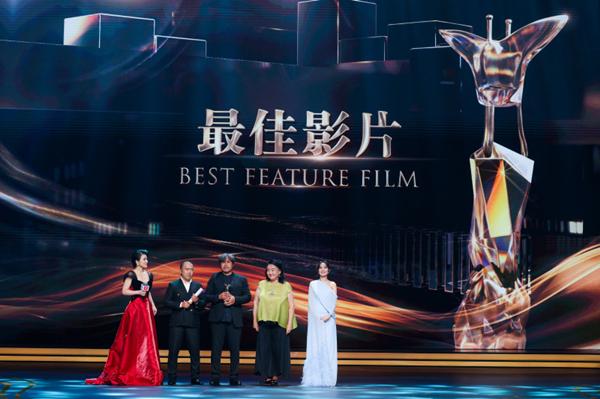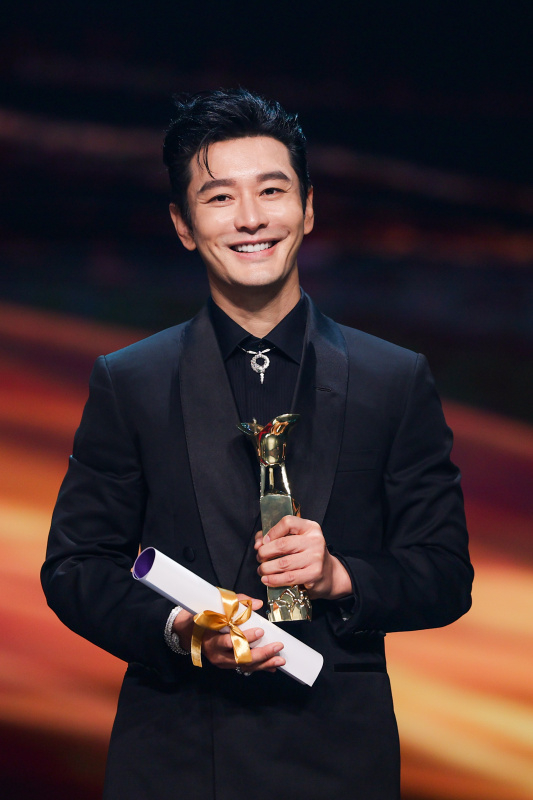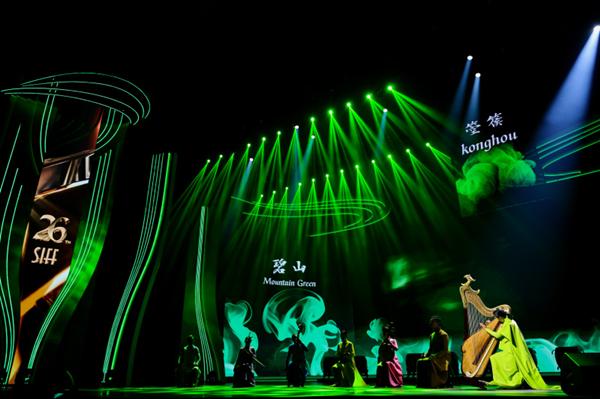
 0 Comment(s)
0 Comment(s) Print
Print E-mail China.org.cn, June 24, 2024
E-mail China.org.cn, June 24, 2024
The Kazakh film "The Divorce" by Daniyar Salamat won the best feature film award at the Golden Goblet Awards Ceremony, concluding the 26th Shanghai International Film Festival (SIFF) on June 22.

Cast and crew of "The Divorce" receive the best film award on stage at the Golden Goblet Awards Ceremony during the 26th Shanghai International Film Festival in Shanghai, June 22, 2024. [Photo courtesy of the SIFF Organizing Committee]
The film's lead actor, Omarova Amira, also took home the best actress award for her portrayal of a determined and resilient woman.
The jury praised "The Divorce" for its sophisticated story that blends comedy, farce and tragedy, moving fluidly from the public sphere to the intimate relationship of a couple in crisis. They commended the filmmaker's ability to create a feeling of innocence that radiates throughout the film and its characters, a quality they considered rare in contemporary cinema.
Salamat revealed that the film, set in the 1920s, took him 10 years to prepare and was costly to fund. He stated that the film aimed to demonstrate the changes experienced by families and individuals at that time, particularly the evolution of women's status in family and society.
The jury grand prix went to the Argentine film "Adult" by Mariano Gonzalez, which reveals a country's social degradation through a teenager's eyes. Georgian-born Bakur Bakuradze won the best director award for his semi-autobiographical film "Snowflakes in My Yard," a Georgia-Russia co-production portraying a protagonist going through an existential crisis.

Chinese actor Huang Xiaoming poses with his best actor award trophy on stage at the Golden Goblet Awards Ceremony during the 26th Shanghai International Film Festival in Shanghai, June 22, 2024. [Photo courtesy of the SIFF Organizing Committee]
Chinese actor Huang Xiaoming won best actor for his role as a disabled individual in Wei Shujun's "Don't Worry, Be Happy." The jury recognized "precious belief and strength along with the warmest humanity" through the eyes of Huang's character.
Reflecting on his 26-year career in his acceptance speech, Huang said, "Despite life's fluctuations and challenges, including feelings of helplessness, disappointment, and confusion I have encountered, standing here today reconnects me with the original aspiration, optimism, and courage of my 18-year-old self, reinforcing my resolve and courage to continue on this path."
Other notable Chinese wins included the best screenplay award for the writers of Gu Changwei's "The Hedgehog," a poignant story about a stuttering boy and his eccentric uncle, both societal outcasts, who forge a unique friendship. Chinese cinematographer Zhang Ying received the best cinematography award for his exceptional work in Guan Hu's "A Man and A Woman."
Pan Zhiqi's "Ms. Hu's Garden," a documentary shot over 12 years exploring the lives of Ms. Hu and her son centered around their low-cost inn, won the best documentary film award.
Iranian director Ahmad Bahrami received the outstanding artistic achievement award for "The Wasteman," a potent and creative exploration of the human condition in times of cataclysm.
The best animated feature prize went to the Japanese film "The Colors Within" by Naoko Yamada, while the Chinese production "Kill the Horse" by Guo Xiaoruo won best animated short.
The Israeli production "The Event Horizon" by Shira Geffen took home the best live-action short film award.

A music performance is staged at the Golden Goblet Awards Ceremony during the 26th Shanghai International Film Festival in Shanghai, June 22, 2024. [Photo courtesy of the SIFF Organizing Committee]
This year's SIFF received over 3,700 film submissions from 105 countries and regions, with 2,224 applying for the Golden Goblet Awards race. Fifty works were shortlisted for various categories, including the main competition, documentary, and animation.
The festival also featured various events, such as forums, a film market, the Belt and Road Film Week, and Sci-fi Film Week. German director and Golden Goblet Awards juror Matthias Glasner expressed his appreciation for the charm of Shanghai as the "city of cinema," stating, "Here, we are with films, with what our passions are for, and films become our common language."